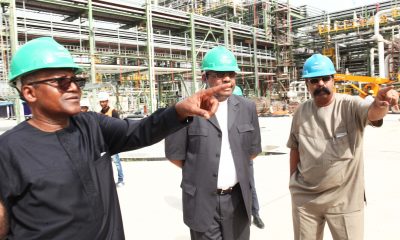Health
Dangote, Imouhkuede launch Africa Business Coalition for Health

The forum is expected to unify Africa’s key decision makers in exploring opportunities for catalysing growth in the continent’s economy, through business partnerships to invest in the health sector
ADDIS ABABA, Ethiopia, February 13, 2019/ — An ambitious platform designed to bring together business leaders in Africa to collaborate with heads of government and other stakeholders to tackle basic health challenges in Africa has been launched in Addis Ababa, Ethiopia with assurances from government to collaborate for a healthier Africans.
The platform, African Business Coalition for Health (ABC Health) was launched with commitments by all partners and stakeholders to put efforts together to improve basic health care services in the continent during the inaugural Africa Business: Health Forum 2019, which witnessed the launch of the official logo of the ABC Health.
The ABC Health is a joint initiative of Aliko Dangote Foundation; GBCHealth, and United Nations Economic Commission for Africa (UNECA), with the objective of driving business leadership, strengthening partnerships, and facilitating investments to change the face of healthcare in Africa.
Taking place on the margins of the 32nd African Union Summit Heads of Governments and Business Community leaders across Africa, the forum examined opportunities to accelerate economic development and growth of the continent through a healthcare reform agenda that focuses on the wellbeing of employees for a more active and productive workforce.
The forum is expected to unify Africa’s key decision makers in exploring opportunities for catalysing growth in the continent’s economy, through business partnerships to invest in the health sector.
In his opening remarks, the Chairman of Aliko Dangote Foundation, Alhaji Aliko Dangote, who was represented by the Foundation’s Executive Director, Halima Aliko-Dangote said Africa Business Health Forum would identify issues and solutions to Africa’s health challenges with a view to mobilizing the will to confront it headlong.
He said it is a well-known fact that there is a vital relationship between health and economic growth and development in Africa as healthy populations live longer, are more productive, and save more. Access to essential health services is an important aspect of development.
Dangote stated that “Governments from both developed and developing countries are increasingly looking at public-private partnerships (PPPs) as a way to expand access to higher-quality health services by leveraging capital, managerial capacity, and know-how from the private sector.”
According to him, “Africa’s healthcare systems demand significant investments to meet the needs of their growing populations, changing patterns of diseases and the internationally-agreed development goals.
He said as a businessman, and through Aliko Dangote foundation, he is committed to working with governments and key stakeholders for the development of impactful health initiatives in Africa in the belief that private sector leaders have a strong role to play.
Back in his home country, Dangote informed his audience that in keeping with his passion to see a healthier African people and better continent he has proposed and charged business leaders to commit at least one percent of their profit after tax to support the health sector.
In his own remark, the Co-Chair of the GBCHealth, Aigboje Aig-Imoukhuede, said while Africa has made significant progress in the funding of healthcare, “we are still very far from where we need to be to achieve SDG Goal 3,”
He lamented that the healthcare in Africa is constrained by scarce public funding and limited donor support, and that the out of pocket expenditure accounts for 36% of Africa’s total healthcare spend pointing out that given the income levels in Africa, it is no surprise that healthcare spend in Africa is grossly inadequate to meet Africa’s needs leading to a financing gap of N66bn per annum.
Mr Imhokuede said it was clear that African government alone cannot solve this challenge, which is further exacerbated by our growing population and Africa’s changing disease portfolio. Therefore there is no alternative but to turn to the private sector to complement government funding.
Said he “Our continent accounts for less than 2% of global health even though our very fertile people account for 16% of global population and carry 26% of the global disease burden. By 2050 Africans will account for more than 50% of global population growth much of that coming from my country Nigeria, a great opportunity and at the same time a ticking time bomb should we fail our health systems quickly.
“That is why we have gathered here in Addis Ababa today to see how together we can fix health in Africa. The private sector and the public sector working together as partners have the potential to change Africa’s healthcare from doom and gloom to progress and results. Africa’s private sector has great capacity to be relevant partners.
“The private sector must be encouraged to optimize and step up its involvement and contribution to health funding in Africa. We have seen what global private sector players accomplished in the fight against the AIDS epidemic through powerful coalitions such as GBCHealth. This is an indication of the power of consolidated effort which Africa’s growing private sector can bring to solving our health challenges.”
“African leaders now have a stronger sense of urgency to combat the lack of quality health care that Africans endure. The inequality of healthcare available to Africans compared to people in other parts of the globe is vast and unacceptably pervasive. With the cooperation of both the public and private sectors, there is a huge potential to boost health outcomes with significant financial gains,” said Aigboje Aig-Imoukhuede, Co-Chair GBCHealth.
The Executive Secretary of the United Nation Economic Commission for Africa (UNECA), Vera Songwe regretted that that Africa with over 50 countries is struggling to combat her healthcare challenges but that organizations such as being launch offer a veritable perspective from the private sector to the solutions to Africa’s health care problems.
She said about $17.3 worth of drugs are imported into African Continent and that if Africa can manufacture those drugs, then that would be 17.3 billion worth of jobs created.
However, to attract the participation of African private sector, there is the need to create enabling environment. “To the private sector, our leaders are expecting you to invest in healthcare because you will get higher returns than you can get anywhere else.”
According to her, a healthier Africa would be a happy Africa and a happy Africa will be a productive Africa.
One after another, the three African heads of governments, namely President of Republic of Djibouti, Omar Gilles; the Ethiopian Prime Minister, Abiy Ahmed; and Botswana President Mokgweetsi Masisi took turn to explain what their administrations have been doing to improve health care delivery services in their respective countries.
They also gave lack of adequate funding as part of the problems militating aainst achieving their administrations’ plan to provide sound health care services just as other African countries.
They all endorsed the establishment of Africa Business Coalition for Health and concluded that it would provide opportunities to accelerate economic development and growth of the continent through a healthcare reform agenda that focuses on the wellbeing of employees for a more active and productive workforce.
Distributed by APO Group
Health
Inaugural Pan-African Nutrition and Health Summit set to shape a healthier continent

The inaugural edition of Africa’s Nutrition and Health Summit is set to convene on November 16, 2024, bringing together an extensive network of healthcare practitioners, nutrition experts, agricultural stakeholders, policymakers, and influential leaders from all over the continent under the theme, ” Soil to Wellness: Shaping a United Approach to Africa’s Health.” This groundbreaking summit aims to address the critical rise of non-communicable diseases (NCDs) across Africa through integrative approaches to preventive health, nutrition, and sustainable lifestyle practices.
This movement would explore holistic and practical solutions that unite stakeholders along the health and nutrition value chain, with a critical focus on how surging rates of NCDs like diabetes, hypertension, and obesity can be curbed via sustainable agriculture, improved food quality, and healthier lifestyle choices, to reshape our food and lifestyle culture, thereby laying a foundation for better health outcomes, for generations to come.
A Key Focus on Nutrition and Lifestyle Practices
The summit’s agenda will include panels on integrative approaches to nutrition and preventive health, the dual burdens of malnutrition and obesity, the impact of digital health in preventing diet-related diseases, and the role of sustainable agriculture in food quality. Our holistic approach strives to demonstrate how Africa’s diverse and rich agricultural resources can play a pivotal role in ensuring food security, balanced nutrition, and wellness for all citizens.
Call to Action
The inaugural edition of ANHS is especially relevant to anyone invested in the long-term health and wellness of the African continent. Such stakeholders are not limited to health professionals, nutrition experts, agricultural stakeholders, policy influencers, researchers, food producers, and processors. It is indeed a legacy-defining opening for businesses and community leaders interested in leaving their prints in the sands of policies that would advance health and wellness on the continent.
Participants will gain insights from leading experts and join the cause to champion Africa’s health by focusing on the most essential aspects of disease prevention and overall wellness. Now, more than ever, it is crucial to prioritize wellness at the societal level, addressing the connections between soil health, food quality, and sustainable practices that contribute directly or indirectly to healthy living.
Join us at the inaugural edition of Africa’s Nutrition and Health Summit on November 16, 2024, as we unite to shape a healthier continent – one that intentionally harnesses her resources and expertise to combat non-communicable diseases.
Register here to attend ANHS 2024
For more information, press inquiries, or partnership opportunities, please contact:
RSB
Official Branding Partner of ANHS
Health
Dr. Jesupelumi Adenihun: Adopting a lifestyle of sustainable health practices with food

Dr. Jesupelumi O. Adenihun (Image: Supplied)
You have likely heard the saying, “You are what you eat,” and it couldn’t be truer. What we consume plays a far greater role in our health than many of us realize. Over time, our eating habits can either support our body’s natural healing processes, leading to improved health and vitality, or contribute to nutrient deficiencies, inflammation, and even chronic diseases.
What this means is, our eating habits over time sets off a series of chain reactions in our bodies that impact our overall well-being. The good news, however, is that by consistently making the right food choices, we can put ourselves on the path to a state of good health and well-being. While this might sound daunting at first, it is often the small, consistent actions that yield the best results. Let’s take a look at 10 simple but effective habits you can begin to cultivate for better health and adopt as lifestyle practices:
- Substitute soda with water: No beverage is more refreshing or beneficial than plain water. It hydrates, cleanses, and confers numerous health benefits.
- Snack on nuts and seeds: When you are craving a snack, go for nuts or seeds, unless you have an allergy. They are nutrient-dense and can also be satisfying.
- Opt for grilled or baked over fried: Choosing grilled or baked foods helps reduce unhealthy fat intake without compromising on flavor. This also helps reduce the risk of developing high cholesterol levels which is a cardiovascular risk.
- Enjoy homemade smoothies over sugary drinks: When time permits, make homemade smoothies making use of reliable recipes. If you are short on time, consider vendors who provide fresh, nutrient-packed options.
- Practice mindful eating: Mindful eating means being fully present during meals, savoring each bite, and listening to your body’s signals. Eating mindfully is a game changer for a lot of people.
- Be well-informed about what you consume: Whether it’s food or drinks, it is essential that you stay conscious of what’s in your food and drinks. Many packaged products contain hidden sugars that the body doesn’t exactly need. Always take a moment to check the ingredients.
- Add more vegetables to your plate: Think beyond the usual veggies—some varieties exist which also depends on your geographical location. Be open and willing to explore new options and add color to your meals.
- Prioritize lean proteins: Not all proteins are created equal. Make lean protein choices and consider plant-based options to support your overall health.
- Use natural spices over salt-laden seasonings: High salt intake is known to be a contributor to heart-related conditions like hypertension. Opt for natural herbs and spices to add flavor without carrying on health risks.
- Stay physically active: Find an activity you enjoy and can commit to, whether you are at home or on the go. Consistency is key. Also seek the counsel of a coach if you need to.
Remember, true wealth lies in your health. Let each meal choice you make be a step toward a healthier, more vibrant life. Eat to wealth, health is wealth.
Written By: Dr. Jesupelumi O. Adenihun (Nutrition Coach, Preventive health care specialist).
Health
Bridging The Gap Between Menstrual Health and Mental Health in Africa

Menstrual health is not just about periods; it’s about breaking the cycle of exclusion and empowering the future of Africa – one girl at a time.
Empowering women and girls who menstruate worldwide starts with breaking the silence around periods. Eno, a 14-year-old girl from a remote community in the south, shrinks when her period arrives each month. Shame and fear are a constant part of her experience. “At school, whispers follow me. They call me ‘dirty’ because I can’t afford pads. I use the white piece of cloth my mother gave me and the extra layer of pad I had sewn on our neighbor’s machine using pieces from his shop.” Eno’s story, though heartbreaking, is far from unique. Across Africa, millions of girls and women face a hidden crisis: period poverty.
Period poverty refers to the inability to afford and access menstrual products, sanitation and hygiene facilities, and education and awareness to manage menstrual health. Globally, more than two billion people around the world menstruate monthly.
Menstruation, a healthy and natural biological process continues to be shrouded in silence and stigma across many parts of Africa. This silence perpetuates a cycle of neglect and exclusion, where the menstrual health needs of women and girls are ignored, leading to significant physical and mental health issues.
Daily, women and girls are unable to afford sanitary pads, forcing them to resort to unhygienic alternatives like old rags, leaves, old clothes, cotton wool, toilet paper, newspaper, and make-shift hygienic pads. This lack of access not only affects their physical health but also their mental well-being, as they experience anxiety, shame, and isolation during their menstrual cycles. With limited to no access to safe water and sanitation to manage their menstrual health and hygiene, these women and girls who cannot afford menstrual products do not live well within their rights and freedoms as their menses interrupt their day-to-day flow.
Human-Centered Stories
To truly understand the impact, we must listen to the voices of those affected. Nike, a 15-year-old girl from a rural community in Ogun State shared, “I have to stay home when I have my period because I don’t have pads. I miss out on school and feel ashamed.” Rukkayat, another young woman from a community in Abuja stated, “The stigma around menstruation is so strong that I can’t even talk to my teachers about it. It feels like a dirty secret. I feel dirty walking around my school. So, I’d rather stay at home when I’m on my menses to endure the pain and take care of myself.” These anonymous quotes reflect a common reality for many girls and women across Africa, highlighting the urgent need for change.
Addressing Stigmas and Period Poverty
Period poverty stems from persistent stigmas around menstruation. These stigmas include the belief that menstruating women are impure, leading to their exclusion from everyday activities and social interactions. Such beliefs not only undermine women’s confidence but also reinforce gender inequality. Periods, already a source of physical discomfort, become a breeding ground for anxiety, shame, and isolation. This can lead to depression, decreased self-esteem, and a reluctance to seek help. The link between menstrual health and mental health is undeniable.
To combat these stigmas, sensitization initiatives, and project outreaches need to provide menstrual products and education. These programs will empower girls with knowledge and resources, breaking the silence and changing societal attitudes toward menstruation.
Breaking the Cycle: Investing in Solutions, Empowering Futures
So, how can we bridge the gap between menstrual health and mental health by showing one can’t do without the other? By recognizing that menstrual health is intrinsically linked to mental well-being, we can create holistic approaches that address both.
- Combat Stigma Through Education: Open conversations are key. Educational programs that address menstrual hygiene and dispel myths can empower girls and communities. Schools and communities should provide comprehensive menstrual education that includes mental health support.
- Invest in Sustainable Solutions: Supporting the development and distribution of affordable, reusable menstrual products is crucial. Access to menstrual products should be seen as a basic human right, and efforts should be made to ensure that all girls and women have the necessary resources.
- Build Sanitation Infrastructure: Safe and private sanitation facilities in schools and public spaces are essential for dignity and hygiene management.
- Champion Advocacy: Investing in menstrual health advocacy at the local and national level can lead to policy changes that prioritize girls’ needs. From providing dignity kits to advocating for safe and private facilities, menstrual hygiene management is crucial for their well-being and development. Through advocating for women and girls, we can ensure every girl has the knowledge and resources she needs to thrive.
By investing in menstrual health, we invest in a future where girls like Eno, Nike, and Rukkayat can access education, participate fully in life, and thrive. Through increased conversations and heartfelt advocacy, the Going North Project initiative is addressing the urgent need for quality healthcare, education, and the eradication of period poverty through targeted outreach programs.
The Going North Project aligns with the Sustainable Development Goals (SDGs) of Education, Health, and Gender Equality, which are crucial for fostering a brighter future and empowering girls – one at a time.
Let us address the urgent need for accessible menstrual health resources and education, highlighting how this issue impacts individuals globally. This advocacy inspires and reminds us that menstrual equity is essential for a just and healthy world. Together, we can break the stigma and ensure menstrual equity for all.
-

 Afripreneur11 hours ago
Afripreneur11 hours agoRedefining Real Estate Marketing: An Interview with Imelda Usoro Olaoye, Founder of Thinkmint
-

 Afripreneur10 hours ago
Afripreneur10 hours agoOluchi Anoruo on building SmartPharm and addressing access to healthcare products
-

 Economy15 hours ago
Economy15 hours agoMeta Hosts its First Youth Summit in Nigeria to Drive Innovation and Empowerment
-

 Technology15 hours ago
Technology15 hours agoLG’s Brand Reinvention: A Global Success Story

















